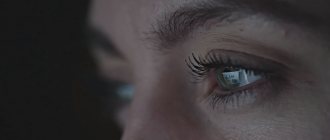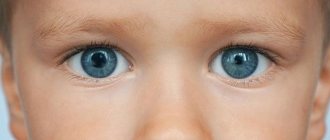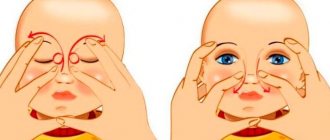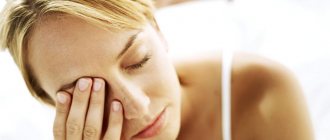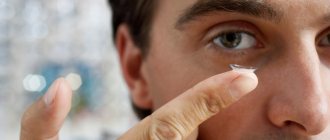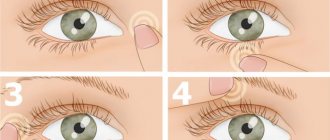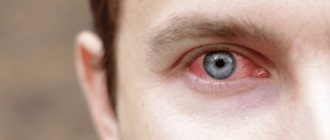- October 11, 2018
- Neurology
- Vladimir Storozhenko
Many people know first-hand what eyelid twitching is. This sensation occurs suddenly and can last for quite a long time. For some people, eyelid twitching does not go away for several months, or even years. This situation requires attention. After all, such a symptom may indicate some pathologies in the body. Next we will look at why the eye twitches and what to do in such a situation.
Physiological causes of twitching
Why does the eye twitch and what should I do? Many people face this question at different times. Twitching of the eyelid causes multiple muscle contractions that occur involuntarily, against the will of the person. This phenomenon in medicine is called hyperkinesis. Eye twitching is also called a nervous tic.
Hyperkinesis can cause a lot of inconvenience to a person. Sometimes attacks last for several hours and do not subside for weeks or even months. It happens that a nervous tic lasts almost continuously throughout the day. This can frighten a person, because twitching of the eyelid indicates certain disorders in the body.
What can cause an eye to twitch? The main reason is a malfunction of the central nervous system. It is she who is responsible for muscle tone and contraction. This failure leads to the activation of muscle tissue, moving simultaneously in the area around the eye.
To get rid of a nervous tic, you need to determine the reason why it occurs. After all, this is not just a physical inconvenience. In some cases, urgent treatment is required. One of the common causes of such failures is constant nervous tension. It has a direct effect on the central nervous system. Some neurological and inflammatory diseases can cause twitching.
People who have suffered a traumatic brain injury may experience complications that manifest themselves as hyperkinesis.
When the problem is in the spine
Twitching of the eyelid can also occur with diseases of the spine. In this case, the nerve fibers that contain motor neurons directed to a specific muscle group are compressed. In this case, it is also very important to visit a neurologist, since only he is able to identify problems and prescribe a full examination of the cervical spine, including an MRI.
In this case, drug therapy comes to the rescue, but quite often it is possible to cope without pills. Just move regularly enough, not necessarily in the gym. You can just walk more and not sit at the computer. It is very useful for diseases of the spine to visit a massage therapist and undergo several sessions of manual therapy.
If twitching of the eyelid of the right eye persists for several weeks, and the discomfort gradually spreads to most of the face, then this indicates a serious neurological deficit. Sometimes the cause lies in ordinary vegetative-vascular dystonia, but often it is associated with a more fatal problem. In order not to worry in advance, you must undergo a full examination by a neurologist, who will be able to clarify the diagnosis and prescribe the correct treatment.
Other causes of twitching
If your eye twitches, what should you do in such a situation? In most cases, this situation requires consultation with a doctor. It is also worth paying attention to what reasons may cause such a situation. There are 8 main factors that provoke hyperkinesis:
- Tired eyes. Reading in public transport or lying down, watching a movie in the dark for more than 2 hours in a row, or staying in front of a monitor for a long time lead to overload of the eye muscles. This is manifested by twitching of the eyelid.
- Lack of sleep. If a person does not get enough sleep, his nervous system is in constant tension. This can lead to various diseases. One of the symptoms of such a malfunction is eyelid twitching.
- Stress, neurosis. Stress can occur under the influence of a variety of factors. This could be a difficult life situation, drastic changes, including positive ones, even just a constantly flashing light at work. Neuroses are also a consequence of dysfunction of the central nervous system. This situation requires specialist consultation.
- Dry eyes. When reading for a long time or working at a computer for a long time, dry eyes can occur. A person, being in front of a monitor or simply concentrating on something, begins to blink more slowly. As a result, the mucous membranes dry out. Therefore, you need to reduce your time working at the computer.
- Taking antihistamines. Antiallergic and vasoconstrictor drugs can lead to the appearance of a nervous tic. This situation should be indicated in the list of side effects for the drug. Therefore, even ordinary drops for a runny nose can lead to hyperkinesis.
- Caffeine, alcohol, consumption of sweets. Various hormonal problems, as well as in the gastrointestinal tract, gradually accumulate when consuming alcohol, sweets or caffeine. Of course, a nervous tic will not immediately start from drinking a cup of coffee. However, over time, adverse factors significantly affect our body. As a result, various malfunctions may occur, one of which may be a nervous tic.
- Unbalanced diet. A lack of certain vitamins and microelements in the body can provoke the occurrence of hyperkinesis. This is especially noticeable with a lack of magnesium, calcium, and B vitamins.
- Weakened immunity. This situation occurs after infectious diseases. This phenomenon will pass a couple of weeks after recovery.
Causes of tic
There are various pathological reasons for the development of a tic, in which the eyelid of the right eye twitches. In addition to the usual lack of sleep, this may be a symptom of vitamin deficiency. To cope with these deviations, it is enough to lead a correct lifestyle, get plenty of rest and sleep, and eat only healthy foods rich in vitamins and microelements. To relax the muscular system of the eye, it is very important to consume a sufficient amount of magnesium ion, which is contained in the following products:
- Bananas;
- Peas;
- Rye bread;
- Dates;
- Beans and some others.
In addition, it is necessary to reduce factors that have a depressing effect on vision and the eyes:
- Hard work at the computer;
- Watching TV (especially in the dark);
- Reading books in low light conditions.
- If the problem has become chronic
In advanced cases, a tic in which the left and right eyes twitch, this symptom may be present almost constantly. In this case, it is very important to find out the true cause of what is happening, since such a symptom can occur against the background of a serious illness. To do this, you should contact a competent ophthalmologist, who will not only conduct a diagnosis, but also select an effective treatment.
Types of spasms
If the eye constantly twitches, in most cases a doctor's consultation is required. He will determine what type of pathology it is, determine the causes and prescribe the correct treatment. There are three main types of eye twitching:
- Spasms of the small eyelid.
- Hemifacial type of twitching.
- Essential benign blephospasm.
Many people are familiar with the feeling of an eye twitching for several days. What to do in such a situation? Most often, the cause of this phenomenon is stress, improper reading regimen, unbalanced diet, etc. This leads to a spasm of the small eyelid.
This type of twitching is usually harmless. It is not accompanied by painful sensations. When the unfavorable factor is eliminated, the twitching goes away within a few days or weeks.
The situation is much more complicated if a person’s twitching causes benign blepharospasm. Most often, this disease develops in middle age. Gradually it progresses. Moreover, the disease is diagnosed in women much more often than in men. The pathology begins with frequent blinking. Eye irritation is constantly felt. This is caused by fatigue, external irritants (for example, low-quality cosmetics), as well as stress.
When essential blepharospasm begins to progress, a person develops increased sensitivity to bright light, wind, and polluted air. Vision becomes blurry. Sometimes facial muscle spasms may occur. In some cases, the muscles become so tense that the person cannot open their eyes for several hours. It is a neurological disorder caused by several adverse factors.
Hemifacial spasm is diagnosed much less frequently. In this case, not only eye twitching appears. The tic also affects the muscles around the mouth. Spasms in this case are observed only on one side of the face. This pathology is caused by pressure from the arteries on the nerves of the facial muscles.
Popular Misconception
Some people believe that tics are caused by one specific muscle that gets tense from time to time. However, this is not the case, because there are a huge number of muscle fibers and nerve endings in the eyelid area. In this regard, the eyelid can twitch due to any muscle. It should be noted that minor muscle tremors that occur in other areas of the body may simply not be noticed. However, a person will definitely feel even the slightest twitching in the eyelid area, which may not appear outwardly, since this area is rich in sensitive nerve endings.
If, in addition to twitching of the eyelid of your right eye, you have other symptoms of the disease (memory deterioration, increased fatigue, etc.), then you should think about proper rest for at least a few days. It is quite possible that the nervous tissue of the brain experienced overload as a result of mental work and emotional experiences. This can easily lead to a lack of oxygen (hypoxia) and B vitamins. In this case, it will be useful to visit a neurologist who will assess the degree of changes in the brain, identify risk areas, and also prescribe a high-quality multivitamin preparation.
When should you see a doctor?
What to do if your right or left eye twitches? It is necessary to eliminate the factor provoking this phenomenon. You should contact a medical specialist in the following cases:
- The tic repeats continuously for a week or more.
- The eyelid twitches very strongly, which leads to involuntary closing of the eyes.
- The spasm affects not only the eyelid, but also other facial muscles.
- The eye turned red, swelling and discharge appeared.
- Vision has decreased.
In these cases, you should consult a doctor. The eye twitches for various reasons. Therefore, treatment should be carried out by a doctor of appropriate qualifications. To determine which specialist to contact, you should first visit a therapist. He will help determine the cause of the pathology, and then refer you to a specialized medical specialist.
If there is a suspicion that such a symptom is caused by disorders of brain activity or blood circulation, you will need to visit a neurologist.
If the eye becomes red, swollen or suppurated, you will need to visit an ophthalmologist. If visual acuity decreases, you should also consult an ophthalmologist. In addition, depending on the type of pathology that caused the nervous tic, additional consultation with the following specialists may be required:
- neurosurgeon;
- infectious disease specialist;
- psychotherapist;
- cardiologist;
- endocrinologist
Self-treatment may not only not give positive results, but also cause harm. Therefore, if certain symptoms occur, you should go to the hospital and undergo a comprehensive diagnosis.
First aid
If your eye twitches a lot during the day, you need to do a number of exercises that will help relieve excess muscle tension. This will ease the condition by reducing the number of contractions. You can do relaxation exercises right at work. To do this, you only need to spend a few minutes of your time.
First, you should sit up straight or get up from your chair. You need to close your eyes and then take a deep breath. The eyes remain closed. This is followed by a slow exhalation. In this case, you should try to relax the muscles around the eyes as much as possible. Next, take a few more inhalations and exhalations.
After this, you need to close your eyes tightly and then open your eyes wide. After this exercise, the unpleasant symptom should go away. This procedure may be needed in an emergency, for example, before a photo shoot or an important meeting, interview, etc.
It is worth considering that such an exercise is effective, but only for a while. If the spasm appears again, you need to look for the cause of its occurrence. Only by eliminating the unfavorable factor can the problem be solved.
Simple moves
The first thing you can try when a tic appears is the following exercises:
- Starting position standing or sitting. You need to close your eyes very tightly, while the edges of the eyelids should be as close to each other as possible. After this you can open your eyes. About 5-6 such cycles need to be completed.
- In the same position, start blinking quickly, without stopping, for 10-20 seconds. This will also help stop eyelid twitching, as it relieves tension in the eye muscles, allowing them to fully relax.
It should be recalled once again that these exercises will only help those patients who have symptoms of fatigue and overexertion. If the causes of the disease are associated with pathological processes, then you need to try other more effective methods.
Actions at home
If the eyelid twitches, immediate treatment should be started. Before contacting a specialist, you should follow a number of simple recommendations. In most cases, they help get rid of an unpleasant symptom without visiting a doctor.
You need to take a day off if your eye twitches all day. Treatment in this case involves rest. You need to get a good night's sleep. Most of the weekend should be spent outside. Under no circumstances should you watch TV or sit in front of a computer. It is also worth giving up reading on this day.
In the following days, you need to reduce your consumption of coffee or other tonic drinks as much as possible. Alcohol is contraindicated. Some people find that alcoholic drinks have a sedative effect. But in this case, alcohol will only worsen the situation.
Stress should be avoided. Of course, this is not always possible. But it’s still worth pulling yourself together and abstracting yourself from the situation at work, thinking about something pleasant. You can turn to gentle traditional medicine. They can have a calming effect on the nervous system. You need to monitor your emotional state. Strong outbursts of emotions, both negative and positive, are now contraindicated.
You need to perform special gymnastics for the eyes. This will improve blood circulation. The eye muscles will also become stronger. You should definitely include nuts, cereals, pumpkin seeds and whole grain bread in your diet. These foods contain large amounts of magnesium.
4.Treatment
In most cases, the eye twitching will stop on its own if you simply get some rest and/or limit your intake of alcohol, coffee, and tobacco. Ticks due to dry eyes and corneal irritation can be treated with drops such as artificial tears - they often help.
There are no effective treatments for benign essential blepharospasm, but there are a number of treatments that can reduce the severity of the disease. One of them, used for treatment in the USA and Canada, is Botox injections
.
When a small amount of botulinum toxin is injected into the eye muscle, spasms decrease or disappear for several months. But the effect gradually wears off and injections are usually repeated. There are also medications
prescribed for mild cases of benign essential blepharospasm, but their effectiveness is approximately 15%.
Some patients benefit from alternative treatments for blepharospasm
- acupuncture, manual therapy, diet therapy, hypnosis. But the benefits of these techniques have not been scientifically proven.
If none of the treatments for blepharospasm are effective, your doctor may recommend a myectomy.
. This is a surgical procedure in which some of the muscles and nerves of the eyelids are removed.
For the treatment of hemifacial blepharospasm
neurosurgical operation
may be prescribed , the purpose of which is to reduce the pressure of the artery on the facial nerve. But such an operation, although it gives a permanent result, can be associated with serious complications and permanent side effects.
Compresses
In addition to the above actions, you need to apply compresses every day if your eye constantly twitches. This is an effective remedy for relaxing the muscles around the eyes. You need to apply cotton swabs soaked in ice water to your eyelids. This recipe is applicable only if there are no traces of conjunctivitis or inflammatory processes in the eyes.
Tea lotions are safer. Refrigerated brew will be required. It can be either black or green tea, preferably without artificial flavors. The tea leaves are wrapped in gauze and left in the refrigerator. When it cools down, the tea leaves are applied to the eyelids. The procedure lasts 10 minutes.
You can also make lotions from anise. Its seeds are poured with boiling water and left for 1 hour. Then the steamed grains are applied to the eyelids for 10-15 minutes. The decoction can be drunk instead of tea with honey. This calms the nervous system.
General recommendations
Most often, the eyes begin to twitch after an emotional shock and stress, so the only way to prevent it is to limit yourself from unnecessary worries.
What to do if your eye starts to twitch:
- Do a mini exercise for your eyes. To do this, you need to time two or three minutes and try to blink your eyes during this time, as quickly and often as possible.
- Drink something calming. You should not rely on medications, as you will quickly get used to them. Mint tea or a decoction of herbs such as sage, lemon balm, and mint are excellent for calming.
- Give your eyes a rest. If you work at a computer or with papers, then you need to take a short break of 5-10 minutes every hour just to recuperate with your eyes closed.
- Eliminate caffeine. If you have a twitching eye, you need to stop drinking drinks that contain caffeine, these include: tea, coffee, and alcoholic drinks.
- Wearing sunglasses will protect your retina from ultraviolet radiation.
- Get at least 8 hours of sleep. You and your eyes need to get enough sleep, and for this you need to go to bed at ten in the evening and wake up at 6 in the morning.
- Close your eyes, take a deep breath and exhale fully, open your eyes and then repeat the exercise again. Five times will be enough.
- Surround yourself with calming colors. For example, blue and green shades have calming properties. Place some blue figurine on your desktop and look at it the moment your eye starts to twitch.
- Go to the doctor. If you have tried to fix this problem yourself, but after a few days your eye still twitches, then a trip to a specialist is inevitable.
- Apply cotton swabs soaked in ice water to your eyes three times a day. The second recipe for lotions: pour a glass of boiling water over a tablespoon of anise seeds, cover and steam for one hour. Steamed seeds are applied to the eyelids for 15 minutes. The remaining broth can be taken with honey before meals. This is also good for the nerves.
- Include nuts, cereals, whole grain bread, pumpkin seeds in your diet - foods containing large amounts of magnesium, since sometimes a deficiency of this substance causes eye twitching.
- It is important to replenish the supply of vitamins and minerals in the body to protect yourself from cramps, magnesium, calcium and glycine are especially important.
ethnoscience
There are many folk recipes that are used if the eye twitches. Traditional medicine knows how to get rid of such a problem. There are many recipes that have a calming effect on the nervous system. Medicinal plants are brewed as tea and drunk throughout the day.
You can make a decoction of chamomile, motherwort or chrysanthemum flowers. These medicinal plants are sold in every pharmacy. The packaging indicates how to brew such tea. You can take the indicated medicinal plants in equal parts and pour boiling water over them. When an hour has passed, you need to strain the product through cheesecloth.
Melissa, linden, and valerian effectively calm the nervous system. These plants are also taken in the form of teas. You can purchase ready-made tinctures at the pharmacy. They are drunk according to the manufacturer's instructions.
Treatment
If the eye twitches, more serious treatment may be required. By contacting a neurologist, you will need to undergo an examination. After this, the doctor will assess the severity of the failure and prescribe medication. The regimen includes many different drugs. They are chosen depending on the type of disease that caused the eye twitching.
Most often, patients are prescribed to undergo a course of physiotherapy and massage. Comprehensive treatment will help restore the functioning of the nervous system. Folk recipes will be ineffective in case of serious failures.
Solving psychological problems
Psychological trauma may explain why the eye twitches. What to do in this case? It is worth noting that drugs in this case will be powerless. If some situation does not give a person peace, he has experienced psychological trauma and cannot overcome its consequences himself, he needs to consult a psychologist. In this case, only the right therapy will help remove the cause of the nervous breakdown. You need to think positively. This gives inner peace.
Having considered why the eye twitches and what to do in such a situation, you can quickly get rid of not only the unpleasant symptom, but also the main reason that provoked its appearance.
Why does the eye twitch?
The main cause of eye twitching is muscle strain. Medical experts associate involuntary contraction primarily with the rhythm of life of patients and only then with a number of other factors. This is confirmed by disease statistics: residents of large cities most often experience the symptom.
The lower eyelid or the upper eyelid may twitch separately, the eye may itch or hurt, it all depends on the exact cause of the symptom and on the individual characteristics of the patient’s body.
Why the eye twitches: reasons
- Stress, depression, overwork and other manifestations of excessive excitation of the central nervous system.
A clear sign that such a phenomenon is caused by stress: it occurs suddenly and passes quickly enough. The modern rhythm and way of life of a person contributes to the occurrence of stressful situations. When stressed, the body produces the hormone epinephrine or adrenaline. Its task is to allow a person to make quick decisions, collect himself and determine in a split second whether to run away or defend. High concentrations of adrenaline cause involuntary contraction of muscles, including the muscles of the eye. At the same time, a nervous tic is not always observed under severe stress. In this way, the body can react even to seemingly ordinary events: a change of job, a move, a quarrel with a loved one.
- Diseases of the visual organs.
Most often, these are vision defects that the patient refuses to correct for various reasons (does not want to wear glasses, is afraid to put on lenses, or simply does not know about vision problems). With astigmatism and myopia, the eye muscles are forced to strain more than usual so that a person can clearly see surrounding objects. If vision is not corrected, this situation can lead to seizures. The greater the need to concentrate, the greater the risk. The cause may also be conjunctivitis, as well as other diseases of the visual organs, in which patients begin to blink too often. Another reason is hyperkinesis. This phenomenon is characterized by involuntary contraction of the orbicularis oculi muscles due to disruptions in various centers of the brain. - Dry eyes or dry eye syndrome.
The syndrome develops in people with allergies, working at a computer, in a room with constant air conditioning, in smokers, it can also be a side effect of medications, and people who spend too much time in front of the TV or playing video games are familiar with it. When the eyes dry out, the process of natural hydration of the cornea is disrupted, which can cause overstrain. - Allergy.
When allergies occur, the body releases the hormone histamine, which sends a signal to the brain about the presence of harmful substances in the body. If you do not control the release of the hormone, too much of it will enter the blood, and it will begin to cause pathological reactions, in some cases a nervous tic begins, accompanied by itching, lacrimation or swelling.
- Lack of sleep.
Eye twitching and lack of sleep or insomnia are directly related: if the muscles and organs do not get the rest they need, they do not relax, they become overstrained, and accordingly, either the lower or upper eyelid begins to twitch.
- Excessive alcohol consumption.
High doses of alcohol primarily affect the human nervous system; alcohol intoxication leads to disruption of conduction in nerve fibers and in some cases can provoke the development of a nervous tic. In addition, drinking alcoholic beverages can affect the quality of sleep, and we wrote about this in the previous paragraph.
- Excessive consumption of coffee, tea, carbonated and energy drinks, chocolate.
Caffeine, which is part of many favorite products, increases the sensitivity of muscles, they begin to react sharply to external stimuli. - Working in poor lighting.
Often, this symptom can be caused by excessive visual stress, such as prolonged work with a PC, reading in poor lighting, etc. Especially if the patient, for various reasons, does not use the corrective means he needs (does not want to wear glasses, is afraid to put on lenses, simply does not know about vision problems). in such cases, the eyes are under even greater tension, which can cause twitching of the eye (eyelid).
